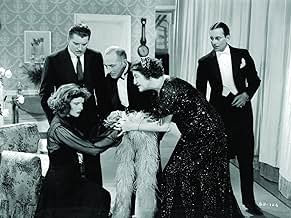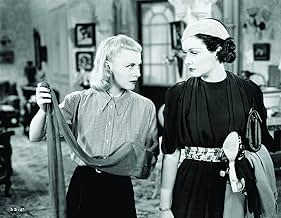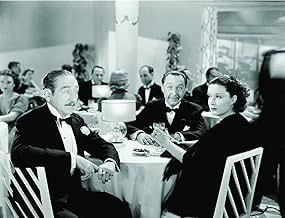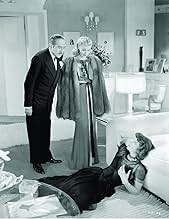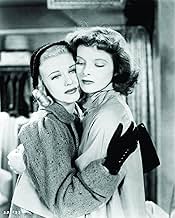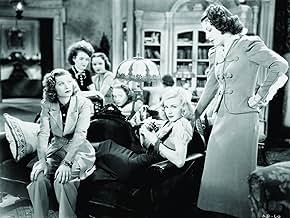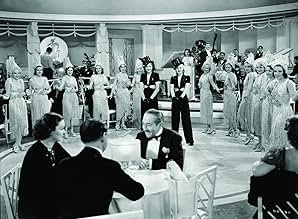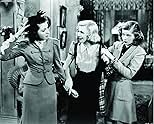AVALIAÇÃO DA IMDb
7,7/10
9,6 mil
SUA AVALIAÇÃO
Adicionar um enredo no seu idiomaA chronicle of the ambitions, dreams, and disappointments of aspiring actresses who all live in the same boarding house.A chronicle of the ambitions, dreams, and disappointments of aspiring actresses who all live in the same boarding house.A chronicle of the ambitions, dreams, and disappointments of aspiring actresses who all live in the same boarding house.
- Direção
- Roteiristas
- Artistas
- Indicado a 4 Oscars
- 5 vitórias e 5 indicações no total
Avaliações em destaque
Katharine Hepburn takes up residence in a theatrical rooming house in "Stage Door," one of the great examples of ensemble acting in film.
Besides Hepburn, the film features Adolph Menjou, Lucille Ball, Ann Miller, Ginger Rogers, Andrea Leeds, Eve Arden, Constance Collier, and Gail Patrick.
Hepburn is a the daughter of a wealthy man who comes to New York to try her hand at acting. She talks a good game, but as we soon learn, she has no emotional understanding or connection to acting at all, approaching everything intellectually.
All of the women are pursuing careers in theater, some with more success than others, and Patrick has a sugar daddy (Menjou). Leeds is the tragic character, a star from the previous season who can't find work but is desperate for the lead in "Enchanted April."
The atmosphere created by director Gregory Lacava perfectly evokes the lively atmosphere of young women living together, sitting in the parlor complaining about food, men, and work or lack of it, as they sing, joke, play piano, strum the ukulele, and talk on the phone - all at once.
The acting is uniformly excellent, with each actress creating a unique character. Lucille Ball gives evidence of the comic timing that would make her one of the greatest TV stars of all time, and there are plenty of ironic one-liners to be had from Eve Arden, and Ginger Rogers matches her in sarcasm.
Ann Miller was supposedly 14 when she made this film; it doesn't seem possible but that was her story and she stuck to it. We do get to see a little bit of her tapping.
Andrea Leeds, bearing such a strong resemblance to Olivia DeHavilland, gives a touching performance as the doomed Kay, who does not have the emotional stability to withstand what can be a devastating career.
It's an extremely melodramatic role and rather than have her play against this, LaCava had her play to it, thus dating what could have stood as a compelling performance even today.
The climactic scenes toward the end are pure '30s, stripping the film of previous lightness and going into tragedy but are effective and real tear-jerkers. By the film's end, though, we've come full circle.
The film is based on the play of the same name which is actually quite different. The whole idea was probably based on the Studio Club in New York City. "Stage Door" is wonderful and the script, acting and direction make it a deeply satisfying experience.
Besides Hepburn, the film features Adolph Menjou, Lucille Ball, Ann Miller, Ginger Rogers, Andrea Leeds, Eve Arden, Constance Collier, and Gail Patrick.
Hepburn is a the daughter of a wealthy man who comes to New York to try her hand at acting. She talks a good game, but as we soon learn, she has no emotional understanding or connection to acting at all, approaching everything intellectually.
All of the women are pursuing careers in theater, some with more success than others, and Patrick has a sugar daddy (Menjou). Leeds is the tragic character, a star from the previous season who can't find work but is desperate for the lead in "Enchanted April."
The atmosphere created by director Gregory Lacava perfectly evokes the lively atmosphere of young women living together, sitting in the parlor complaining about food, men, and work or lack of it, as they sing, joke, play piano, strum the ukulele, and talk on the phone - all at once.
The acting is uniformly excellent, with each actress creating a unique character. Lucille Ball gives evidence of the comic timing that would make her one of the greatest TV stars of all time, and there are plenty of ironic one-liners to be had from Eve Arden, and Ginger Rogers matches her in sarcasm.
Ann Miller was supposedly 14 when she made this film; it doesn't seem possible but that was her story and she stuck to it. We do get to see a little bit of her tapping.
Andrea Leeds, bearing such a strong resemblance to Olivia DeHavilland, gives a touching performance as the doomed Kay, who does not have the emotional stability to withstand what can be a devastating career.
It's an extremely melodramatic role and rather than have her play against this, LaCava had her play to it, thus dating what could have stood as a compelling performance even today.
The climactic scenes toward the end are pure '30s, stripping the film of previous lightness and going into tragedy but are effective and real tear-jerkers. By the film's end, though, we've come full circle.
The film is based on the play of the same name which is actually quite different. The whole idea was probably based on the Studio Club in New York City. "Stage Door" is wonderful and the script, acting and direction make it a deeply satisfying experience.
In fact this film version of a stage play by Edna Ferber and George S Kaufman, directed by Gregory La Cava is 70 years old and although it may show a wrinkle here or there - like having Adolph Menjou as the romantic lead - the youthful energy in the acting and dialog has surfed the waves of time unscathed. The bunch of girls populating the Footlights lodgings is a smashing crowd. Katharine Hepburn, brisk and Hepburnish already to the hilt. Ginger Rogers drinks, scratches and dances a duet with Ann Miller. Eve Arden, as usual, delivers the best one liners and Lucille Ball seems ready for a startling career. Andrea Leeds got an Oscar nomination and Constance Collier plays an over the hill actress that becomes Hepburn's minder, just like in real life. The film moves at an incredible speed and I defy you not to tear up when Hepburn makes her entrance with the Calla Lillies in bloom.
Thanks to the BBC this finally appears as a long-overdue TV showing in tribute to Kate Hepburn. A stunning cast includes Ginger Rogers, Eve Arden, Lucille Ball and Ann Miller (both looking impossibly young!), Constance Collier (one of the great old troupers), Andrea Leeds, Adolphe Menjou, and in the cast but not credited an hilarious performance from Franklin Pangborn as Menjou's butler, plus appearances from Jack Carson, Grady Sutton, Ralph Forbes. It is a classic film fan's joy even if the plot does creak along on a variation of the 'heiress who wants to act' theme.
Hepburn looks fabulous and that brittle voice was rarely used better than to deliver the sparkling script required. Great role for Ginger too (time off from dancing with Fred, this being around the middle of their legendary partnership). Love it. One to treasure.
Hepburn looks fabulous and that brittle voice was rarely used better than to deliver the sparkling script required. Great role for Ginger too (time off from dancing with Fred, this being around the middle of their legendary partnership). Love it. One to treasure.
10zetes
I don't quite know how to put my passion for this film into words. It's something I never expected. I taped it off of television because I've been on a Ginger Rogers kick lately (I think I'm in love with her), and very luckily experienced something of enormous quality.
There is not a regular plot. Unlike most classical cinema, the goal towards which the film is striving is quite tenuous. Basically, the goal is for Katherine Hepburn to get a part in a play and give a good performance, but it is never stressed. Instead, what we get is more of an ensemble piece. There are characters who are more central than others, but we get to know well a great number of characters. And we live with them, experience their dreams, hardships, and successes, falling more and more deeply in love with them every minute, caring about them as we would dear friends or siblings.
It is most often referred to as a comedy, and the dialogue tends to be hilarious (Ginger Rogers is in full form here, wisecracking at the speed of light), but the film's drama is very affecting, too. This film's ending is so beautiful, and like all great films, we're reluctant to say goodbye to the characters. Fortunately, since I have it on tape, I can visit the boarding house any time I want. Unfortunately, since this film is neither on VHS nor DVD, you probably cannot. Watch for it on AMC or TCM or other stations that play classic films. You will not be disappointed. 10/10
There is not a regular plot. Unlike most classical cinema, the goal towards which the film is striving is quite tenuous. Basically, the goal is for Katherine Hepburn to get a part in a play and give a good performance, but it is never stressed. Instead, what we get is more of an ensemble piece. There are characters who are more central than others, but we get to know well a great number of characters. And we live with them, experience their dreams, hardships, and successes, falling more and more deeply in love with them every minute, caring about them as we would dear friends or siblings.
It is most often referred to as a comedy, and the dialogue tends to be hilarious (Ginger Rogers is in full form here, wisecracking at the speed of light), but the film's drama is very affecting, too. This film's ending is so beautiful, and like all great films, we're reluctant to say goodbye to the characters. Fortunately, since I have it on tape, I can visit the boarding house any time I want. Unfortunately, since this film is neither on VHS nor DVD, you probably cannot. Watch for it on AMC or TCM or other stations that play classic films. You will not be disappointed. 10/10
Framed and shot as though a stage play which it was originally, but much changed for the film and with a stage play within the staged play, le tout ensemble in this witty farce delivers a virtual non-stop, wise-cracking, virtuoso performance. Timing is everything and in comedy, it's particularly so; and the director, Gregory La Cava who cut his teeth, in the silent era, as a director beginning in 1916 doesn't miss a beat with this one.
From a play by Edna Ferber (of Giant fame) and George S. Kaufman, the film tells the story of what happens to a group of aspiring actresses who happen to board at a place called the Floodlights Club in New York City, supposedly. Of course, there are minor players, as in all plays Lucille Ball, Eve Arden, Ann Miller and most of the men, the exception being Adolphe Menjou as a caricature (almost) of the Big Bad Producer of those days. The majors, Katharine Hepburn (as Terry), Ginger Rogers (Jean), Gail Patrick (Linda) and Andrea Leeds (Kay) form the core about which this story revolves.
Which, when all is said and done, is about the ascendancy of Terry as an actress and the decline of Kay as another: out with the old, in with the new, if you will. That would tend to make for a somewhat pedestrian story if it were simply that. Happily, what sets this apart from, say, the almost maudlin characterization by Hepburn in Morning Glory (1933) in a similar situation (for which, however, she did receive a Best Actress award in 1934), is, first, the scintillating dialog. Which means the viewer must really listen: it goes so quickly between characters that you'll miss the one-liners and sight gags if you take a chomp on a sandwich or sip of coffee, or whatever. So, be prepared.
What's left? Well, of course, the great acting by Hepburn, Rogers, Ball, Miller, Menjou, Arden, Patrick and Leeds, the latter getting a Best Supporting nomination for her somewhat overly tearful acting; so much so, she reminded me of Olivia de Havilland, in looks and style.
The direction, already mentioned, is in the hands of an old hand and it shows, explicitly. Add to that the camera work that included almost manic cuts up and down stairs, superb face-on tracking shots and perfect timing while up to a dozen people would mill about in the frame concurrently and with dialog. Confusing? Perhaps to some. Just concentrate on the majors.
What's more interesting for me, however, is the sub-text of this comedy. Made just before USA finally shook free of the Great Depression, as you listen, you'll hear many references to the hard times: at the Floodlights, everybody is down, but not out; rich and unscrupulous producers just want to use and abuse actresses; the women are all scraping for even the lowliest acting or dancing job at the meanest of wages; despondency and depression are endemic. Despite all of that, the women 'soldier' on, pushing themselves to their emotional and physical limits.
Women in the audience at that time must have felt the pull: don't deny your dreams of self-fulfillment, despite what chauvinistic clods of men might say and do, even powerful men. It's a stirring message, albeit idealistic, but it sets the tone for the larger section of a country that was about to engage in the world war which, in a very real sense, changed the role of women as never before. So, some may die, yes, but the show must go on...
There have been a number of introspective and self-referential films about the acting business, Morning Glory being the earliest I've seen. Others include A Star is Born (made and remade many times), All About Eve (1950) arguably the best, I think The Dresser (1983), The Player (1992), and others, but all heavy dramas. So, it's refreshing to find a gem that's prepared to treat the matter lightly, more rather than less.
A final thought: it must have been fun for the actors to act at being actors; it's even more fun to know that the director used much of the banter between the women off-camera to actually use in the film much to the playwrights' displeasure, so I understand.
Recommended for all.
From a play by Edna Ferber (of Giant fame) and George S. Kaufman, the film tells the story of what happens to a group of aspiring actresses who happen to board at a place called the Floodlights Club in New York City, supposedly. Of course, there are minor players, as in all plays Lucille Ball, Eve Arden, Ann Miller and most of the men, the exception being Adolphe Menjou as a caricature (almost) of the Big Bad Producer of those days. The majors, Katharine Hepburn (as Terry), Ginger Rogers (Jean), Gail Patrick (Linda) and Andrea Leeds (Kay) form the core about which this story revolves.
Which, when all is said and done, is about the ascendancy of Terry as an actress and the decline of Kay as another: out with the old, in with the new, if you will. That would tend to make for a somewhat pedestrian story if it were simply that. Happily, what sets this apart from, say, the almost maudlin characterization by Hepburn in Morning Glory (1933) in a similar situation (for which, however, she did receive a Best Actress award in 1934), is, first, the scintillating dialog. Which means the viewer must really listen: it goes so quickly between characters that you'll miss the one-liners and sight gags if you take a chomp on a sandwich or sip of coffee, or whatever. So, be prepared.
What's left? Well, of course, the great acting by Hepburn, Rogers, Ball, Miller, Menjou, Arden, Patrick and Leeds, the latter getting a Best Supporting nomination for her somewhat overly tearful acting; so much so, she reminded me of Olivia de Havilland, in looks and style.
The direction, already mentioned, is in the hands of an old hand and it shows, explicitly. Add to that the camera work that included almost manic cuts up and down stairs, superb face-on tracking shots and perfect timing while up to a dozen people would mill about in the frame concurrently and with dialog. Confusing? Perhaps to some. Just concentrate on the majors.
What's more interesting for me, however, is the sub-text of this comedy. Made just before USA finally shook free of the Great Depression, as you listen, you'll hear many references to the hard times: at the Floodlights, everybody is down, but not out; rich and unscrupulous producers just want to use and abuse actresses; the women are all scraping for even the lowliest acting or dancing job at the meanest of wages; despondency and depression are endemic. Despite all of that, the women 'soldier' on, pushing themselves to their emotional and physical limits.
Women in the audience at that time must have felt the pull: don't deny your dreams of self-fulfillment, despite what chauvinistic clods of men might say and do, even powerful men. It's a stirring message, albeit idealistic, but it sets the tone for the larger section of a country that was about to engage in the world war which, in a very real sense, changed the role of women as never before. So, some may die, yes, but the show must go on...
There have been a number of introspective and self-referential films about the acting business, Morning Glory being the earliest I've seen. Others include A Star is Born (made and remade many times), All About Eve (1950) arguably the best, I think The Dresser (1983), The Player (1992), and others, but all heavy dramas. So, it's refreshing to find a gem that's prepared to treat the matter lightly, more rather than less.
A final thought: it must have been fun for the actors to act at being actors; it's even more fun to know that the director used much of the banter between the women off-camera to actually use in the film much to the playwrights' displeasure, so I understand.
Recommended for all.
Você sabia?
- CuriosidadesWhen Katharine Hepburn delivered her climactic stage speech, Gregory La Cava reduced it to only ten lines and filmed it on a closed set. He later brought in the actors and the extras in the audience and had them react to the filmed speech. Many of them broke down.
- Erros de gravaçãoThe band at Club Grotto, where Jean and Annie perform a dance number, includes a female vocalist who can be seen singing in the background, but no vocals are heard on the soundtrack.
- Citações
Terry Randall: [delivering her opening speech in the play within the movie] The calla lilies are in bloom again. Such a strange flower, suitable to any occasion. I carried them on my wedding day and now I place them here in memory of something that has died.
- Versões alternativasSPOILER: A shot of a man mowing the grass around Kay's grave is missing from some versions.
- ConexõesEdited into Starring Katharine Hepburn (1981)
- Trilhas sonorasPut Your Heart Into Your Feet and Dance
(uncredited)
Written by Hal Borne and Mort Greene
Danced by Ginger Rogers and Ann Miller
Principais escolhas
Faça login para avaliar e ver a lista de recomendações personalizadas
- How long is Stage Door?Fornecido pela Alexa
Detalhes
- Data de lançamento
- País de origem
- Idioma
- Também conhecido como
- Entre bastidores
- Locações de filme
- Empresa de produção
- Consulte mais créditos da empresa na IMDbPro
Bilheteria
- Orçamento
- US$ 952.000 (estimativa)
- Faturamento bruto mundial
- US$ 8.835
- Tempo de duração
- 1 h 32 min(92 min)
- Cor
- Proporção
- 1.37 : 1
Contribua para esta página
Sugerir uma alteração ou adicionar conteúdo ausente


